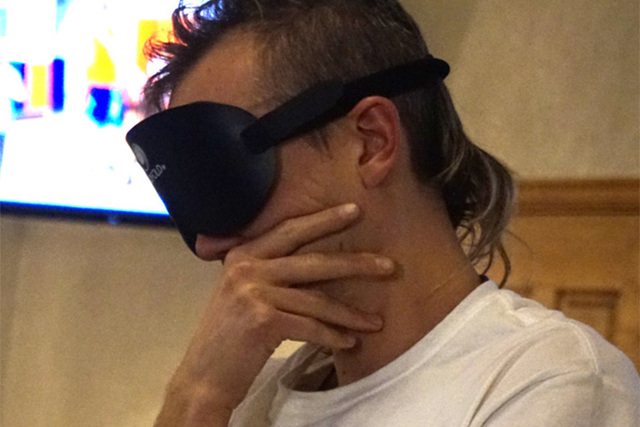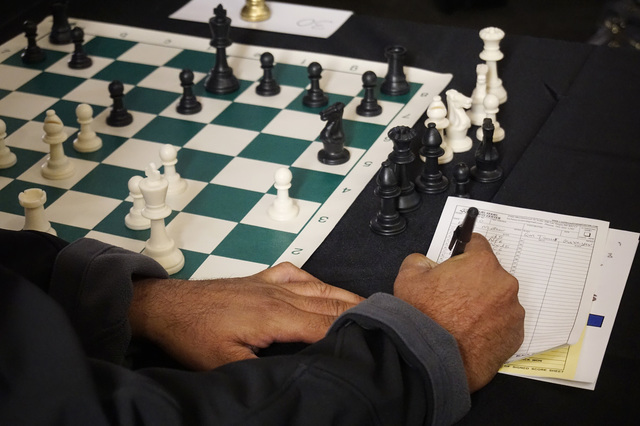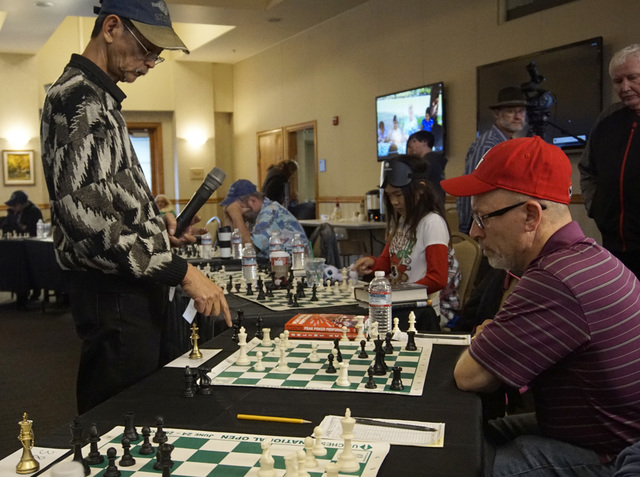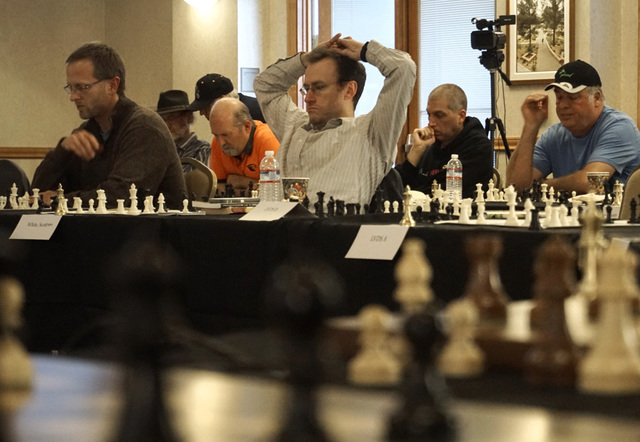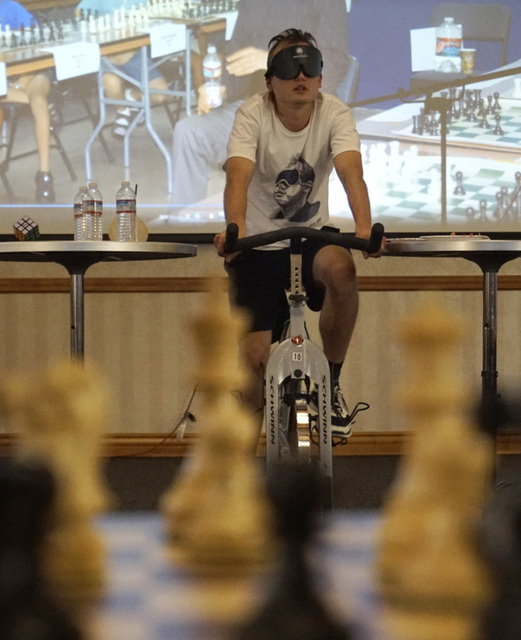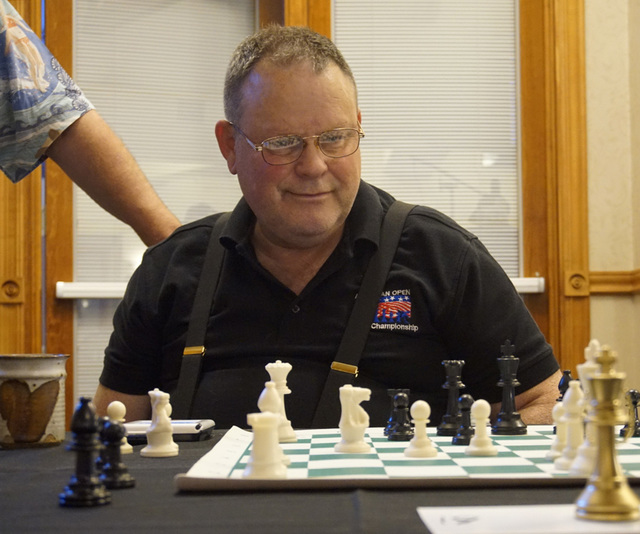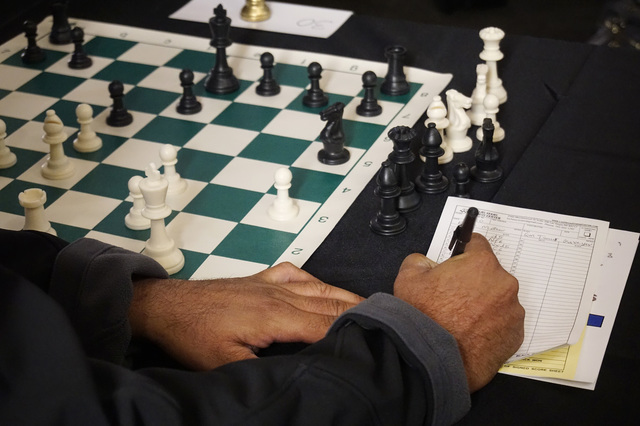Inside the brain of a man who can play and win most chess games blindfolded
For many, remembering where they’ve left their keys and cellphone is challenge enough.
Remembering the layouts of 48 chess boards well enough to play and win most of the games, then, would seem insurmountable.
But that is, in fact, what chess grandmaster Timur Gareyev, dubbed the Blindfold King, attempted and achieved at a recent event at UNLV.
It’s a feat of the human mind, which is why neuroscientists are studying his brain to find out how he does it.
Beginning at 8:15 that Saturday morning, a blindfolded Gareyev played 48 games of chess simultaneously while riding an exercise bike at the university’s Foundation Building.
Adding a blindfold isn’t a new adaptation to the game. George Koltanowski set a previous world record when he played 34 simultaneous games of chess blindfolded in 1937.
Each square on the board is given a coordinate, and the opponent announces where he or she is moving a piece on each turn. But after that initial announcement, the player must remember where all of the pieces are.
A surrogate acts as the blindfolded player’s hand, moving the appropriate piece after he or she decides the next move.
Though many adept chess players could learn to play a game blindfolded, Gareyev’s talent shows in his ability to distinguish among many games at once.
Gareyev rides the exercise bike, a seemingly extraneous part of the whole setup, to help maintain a rhythm and flow. The first few turns of each game are the most difficult, says Gareyev, whose father and grandfather taught him to play chess in Uzbekistan at age 6.
“Once I get through several moves of chess, interestingly enough, even though there’s more variations on the board, more things happening, it’s easier for me to navigate through the possibilities later,” Gareyev says. “The games are more firmly established in my mind.”
Gareyev checkmated the opponent of the final game at 3:38 a.m. the next day, nearly 19.5 hours after making his first move. With 35 wins, seven draws and six losses, Gareyev surpassed the 80 percent win threshold established by Guinness World Records to break the world record for number of simultaneous chess games played blindfolded.
Jesse Rissman, assistant professor of psychology at UCLA, and a team of researchers from the departments of psychology and psychiatry and biobehavioral sciences began studying Gareyev in January. First, they administered behavioral tests, checking his ability to memorize long strings of numbers and letters. Gareyev didn’t perform exceptionally well, leading Rissman to believe that Gareyev’s remarkable ability to retain and later access information during many games of chess doesn’t extend to other areas of his life. In other words, he doesn’t have photographic memory.
“It’s interesting that he hasn’t shown fantastic memory with other kinds of information,” Rissman says. “And that is consistent with what we know about expertise, that people tend to really use their abilities for one type of information.”
Next, the UCLA team scanned Gareyev’s brain at rest and compared it to the scans of both chess novices and chess experts of the same age. They found that Gareyev had greater connectivity between different networks in the brain, specifically the networks that focus inward — monitoring thoughts and feelings, visualizing or retrieving memories — and those that process the surrounding environment.
Rissman describes the interaction between these networks in the average brain as a push and pull. When the mind is focused on the inner world, less bandwidth is devoted to the outer, and vice versa. These networks in Gareyev’s brain seem to be able to engage at the same time and communicate with each other. His level of connectivity ranked higher than any of the chess novices and ranked among the top of the chess experts.
“That, I think, is one clue to what allows him to do this incredible feat,” Rissman says. When Gareyev is blindfolded, he’s using the introspective network to retrieve the positions on the gameboard and visualize potential moves. Rather than simply daydreaming, though, he’s able to focus those thoughts to achieve the goal of winning the game.
What researchers have found so far is that while Gareyev is predisposed to excel at the skills needed for chess — his brain is wired in a certain way — he also developed his level of skill after years and years of practice. If he hadn’t discovered and pursued a passion for chess, that discipline coupled with his brain’s abilities probably would have served him well at another activity.
After completing the 19.5-hour marathon, Gareyev slept about five hours. But after that, he was up and interacting with his former opponents, most of whom were from the Las Vegas Chess Center.
He compares himself to runners who have completed 60 marathons in 60 days. For Gareyev, neither superhuman accomplishment is necessarily a product of physical or intellectual capabilities. Each is a matter of will.
“I believe in the unlimited power of the body and mind to be able to stand up to the challenge and expand in the face of adversity,” Gareyev says.
Read more from Sarah Corsa at reviewjournal.com. Contact her at scorsa@reviewjournal.com and follow @sarahcorsa on Twitter.



